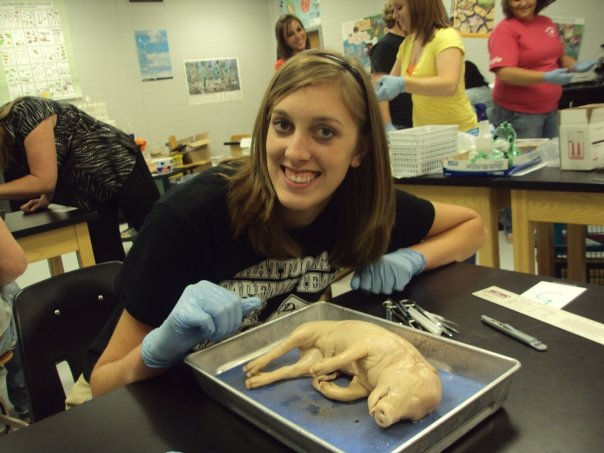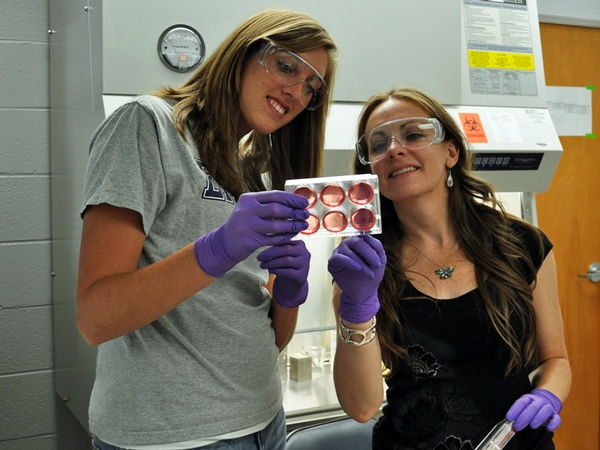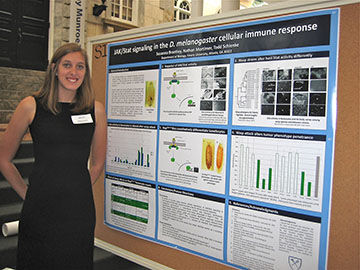My Science Story: Susanna Brantley
- Susanna Brantley
- Mar 22, 2018
- 5 min read
Susanna Brantley is a graduate student in the Developmental Biology program at Stanford. She studies how the environment surrounding adult stem cells promotes survival and proper stem cell differentiation using fruit flies as a model system. Here, Susanna shares her story about her educational background and how mentors have helped motivate her to pursue scientific research in academia.
Like any kid, I went through many ideas of what I would be “when I grow up.” I loved reading and writing throughout middle and high school so I thought I would be an author. When I started applying to college I looked for schools with good business programs, thinking I might go into economics. For a misguided year I thought I could be a ballerina. But five-year-old me was probably the most accurate - as a young child I was fascinated with dinosaurs and wanted to be a paleontologist. Today I am not digging up dinosaur bones, but I am a scientist trying to uncover new knowledge about the world around us.
While I probably owe my initial interest in science to The Land Before Time series, I also spent a lot of time as a young child in the Atlanta Zoo. My house in Grant Park was a short walk away from the zoo, so we got season passes and spent many afternoons with the elephants, lions, and reptiles. Grant Park in the early nineties was not a safe place, and though all I remember are the good times at the zoo, theft, gangs, and gun violence prompted my parents to move away from the city. I went to middle and high school in a small rural town in North Georgia, a place where the major challenge for the school district is getting students to graduate from high school rather than helping them get into a prestigious college. The school has excellent classes that prepare students for doing good work in the real world - nursing, carpentry, welding. But for students interested in school and higher education there were fewer opportunities. It wasn’t until my senior year of high school that we finally had AP classes offered - Calculus, Biology, US History, and English. It was this AP biology course and an incredible teacher that made me see what biology could really be - more than a compilation of facts, but rather a fascinating subject with so many unanswered questions. I remember a specific lab associated with the class that sparked my interest in research. We were transforming bacteria, meaning we were giving bacteria a new piece of DNA. The bacteria were normally unable to grow when exposed to an antibiotic. We forced the bacteria to take up a circular piece of DNA called a plasmid which contained a resistance gene as well as a marker gene that makes the bacteria turn blue. If the experiment was successful, we would see blue colonies growing on our antibiotic-containing agar. We only had enough plasmid DNA for one group to do the transformation, but we got two little blue colonies growing on plates the next day. I remember the whole class huddling around our plate, excited that we had changed the DNA of an organism! It was the spark that made me want to pursue a degree in Biology in college.

Me in 2009 in AP Biology lab dissecting fetal pigs.
My college experience was very unique. I attended Oxford College of Emory University for freshman and sophomore year. Emory University has a unique program in which a small subset of the freshman class attends a different campus outside of the city in Oxford, GA. I took advantage of this program with a scholarship, and it remains the best decision I have made in my educational career. Because there are only freshmen and sophomores at Oxford, I received incredible mentorship from the faculty in biology, chemistry, and physics. I remain in close contact with my mentors from these first two years of college and it was at Oxford that learned how to be a scientist and received the encouragement to apply to prestigious PhD programs later on. During my sophomore year, I had the opportunity to work one-on-one with my professor, Dr. Amanda Pendleton, studying the effects of plant extracts on growth of infectious bronchitis virus, a virus that infects chickens and is similar to the SARS virus. While I completed many successful experiments and am an author on a paper from this lab, the most valuable things I learned from Dr. Pendleton were lessons about scientific questions and the research process. My favorite part of this research experience was the freedom Dr. Pendleton gave me to search the literature and come up with a hypothesis. I felt ownership of my work, and even though the plant extract I chose to study did not affect virus growth, I feel this research experience has had a major impact on each discovery I have made in my future labs.

Me and Dr. Pendleton in 2011 looking at viral plaques as part of a summer research program.
My next major research experience was in the lab of Dr. Todd Schlenke at Emory. Dr. Schlenke believed in me and was proud of my early accomplishments and hard work in the lab and encouraged me to apply for a joint BS/MS degree. I was accepted into the dual degree program and wrote a master’s thesis on my work on the innate immune response of fruit flies (Drosophila melanogaster) to their natural predators, parasitic wasps. From my experience in the Schlenke lab, I learned the utility of a model system. I had previously worked with mice and tissue culture, but the Drosophila model gives a scientist a large tool kit for dissecting questions of molecular and cellular biology. My experience in Dr. Schlenke’s lab showed me what the research process is like and made me realize that I wanted to apply to graduate school.

Me in 2013 presenting a poster on my master’s thesis project at Emory. I won first place!
My Oxford College mentors - Dr. Pendleton and Dr. Nitya Jacob - and my current research advisor, Dr. Margaret Fuller, are the reasons I am at Stanford University pursuing my PhD. I remember applying to PhD programs my senior year and sat down with a male professor whose class I had really enjoyed at Emory. I told him the list of schools that I wanted to apply to and he told me that I should probably add some safety schools to the list, just to make sure I actually get in somewhere. I’m sure he was well-meaning and his advice maybe didn’t have anything to do with the fact that I am female, but my female mentors at Oxford told me I should apply for those prestigious programs - that I was an excellent and would succeed. I think without their words, I would be in graduate school but not at Stanford. Even after words of encouragement, I still had not submitted an application to Stanford. It was ranked as the number one school in the country and I thought I had no chance. It costs money to apply to graduate school and I didn’t have the time to fill out the paperwork to waive the fees, so I had been choosing my applications carefully. My current research advisor came to Emory to give a talk and I met her in a class that I was taking that accompanied the seminar series. She told me to apply to her department, so I did.
Mentors who have told me “you can do it” have been so valuable to my scientific journey. I have chosen to go into academia because of the opportunity to teach and mentor. I also dedicate a large portion of my time to serve communities that are disconnected from and underrepresented in academia. I love where I come from and learned many life lessons from small town America. Now I want to reach out to my hometown and other places like it to be a mentor, a teacher, an example and say “you can do it” to the next generation of scientists.





